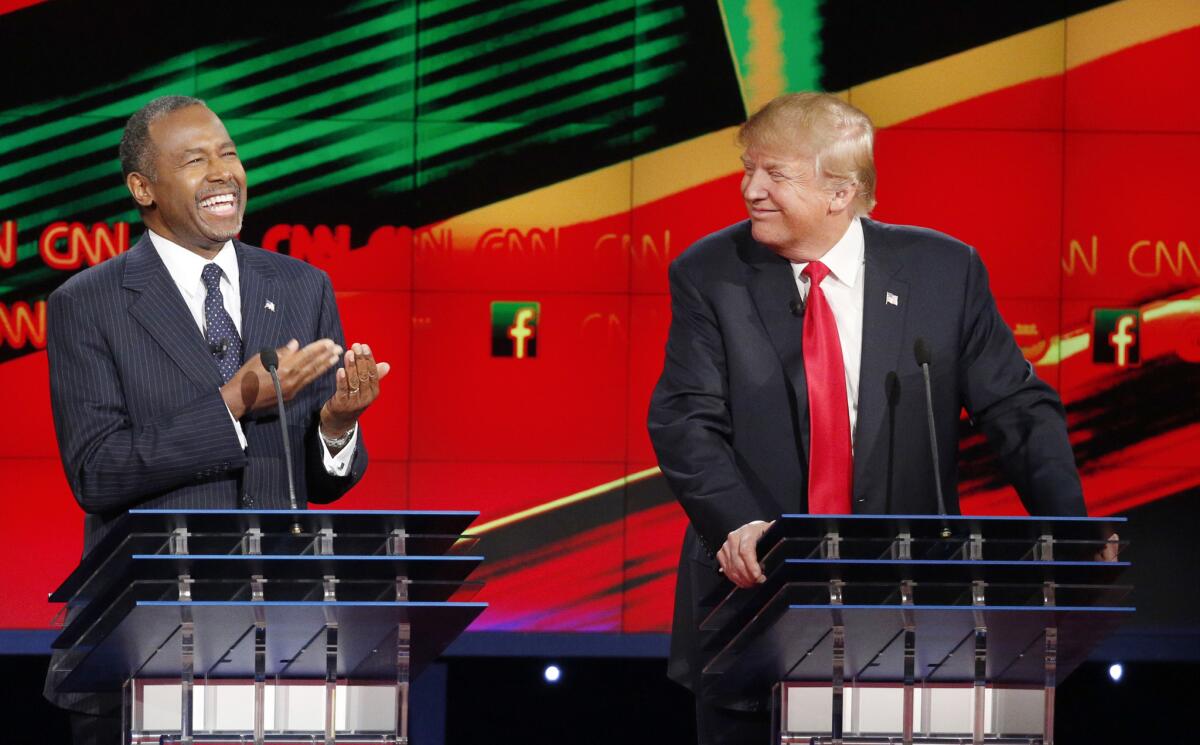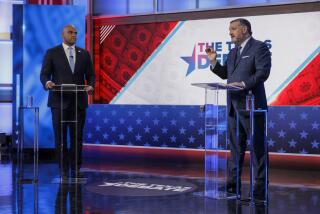Terrorism and tough talk take center stage at Republican presidential debate

Ben Carson, left, and Donald Trump at the Republican presidential debate at the Venetian in Las Vegas.
Reporting from Las Vegas — Republican presidential hopefuls fought to out-tough one another Tuesday night in a raucous debate animated by fears of terrorism and disagreement over how best to prevent attacks like the massacres in Paris and San Bernardino.
Agreeing on the need to destroy the Islamic State terrorist group and eager to blame President Obama and former Secretary of State Hillary Clinton for its ascendance, the candidates quickly squared off in a series of heated exchanges over the line between protecting Americans and trampling their rights.
Donald Trump was at the center of the back-and-forth for much of the evening, provoking rivals as he has throughout the presidential campaign.
He reiterated his call for an open-ended ban on most Muslim immigration to the United States — “We’re not talking about religion; we’re talking about security” — drawing an unusually pugnacious Jeb Bush into the first of several attacks.
“This is not a serious proposal,” the former Florida governor said, suggesting that alienating Muslims would undermine efforts to recruit the Arab allies needed to fight radical Islamists. “Donald is great at one-liners. But he’s a chaos candidate. And he’d be a chaos president.”
Later, after Trump called for deterring attacks by censoring portions of the Internet — to prevent recruitment of radicals — and targeting the families of terrorists, Kentucky Sen. Rand Paul piled on.
He said the proposals would contravene the country’s principles by undermining the 1st Amendment and violating the Geneva Conventions of war.
“It would defy every norm that is America,” Paul said. “So when you ask yourself, whoever you are, that think you’re going to support Donald Trump, think, do you believe in the Constitution? Are you going to change the Constitution?”
Trump shot back: “So they can kill us, but we can’t kill them?”
The nearly 21/2 hours the nine candidates shared a debate stage and traded insults seemed unlikely to reorder the fundamental state of the race, which has Trump ahead and Sens. Ted Cruz and Marco Rubio competing to emerge as the most viable alternative.
While Bush turned in perhaps his strongest performance, the question is whether he is too far back to make up all the ground he needs.
The debate at the Venetian resort on the Las Vegas Strip was the Republicans’ first since the attacks in Paris and San Bernardino, and the setting — a faux opera house, complete with carved balconies, frescoes and red-curtained boxes — lent itself to a certain theatricality.
New Jersey Gov. Chris Christie said he would be willing to risk World War III by shooting down Russian planes that violate a proposed no-fly zone over Syria if Russia were foolhardy enough to think he was “the same feckless weakling that the president we have in the Oval Office is right now.”
Asked whether he would be comfortable as commander in chief summoning weapons of war that would kill masses of innocent civilians, retired neurosurgeon Ben Carson responded eagerly, “You got it, you got it!”
The debate was the fifth face-to-face meeting of Republican hopefuls and fell less than seven weeks before the presidential balloting starts with Iowa’s precinct caucuses.
The candidate placement, with Trump at center stage and Sen. Cruz of Texas to his left, reflected their standing in opinion polls, which show the billionaire and reality TV star consolidating his support among Republican primary voters and Cruz surging into second place nationally and the top spot in Iowa.
The night was a particular test for Cruz, who — unlike others in the field — has strenuously avoided public confrontation with Trump, the better to woo the billionaire’s supporters should he falter. He mostly declined to engage with Trump, instead trading barbs with Sen. Rubio of Florida.
One of the sharpest exchanges involved Cruz’s support for legislation that changed how law enforcement could conduct surveillance and gather data, including ending the bulk collection of information from personal phone calls. Cruz said the bill “strengthened tools of national security,” but Rubio said Cruz’s vote made Americans less safe.
“We are now at a time when we need more tools, not less tools,” Rubio said. “And that tool we lost — the metadata program — was a valuable tool we no longer have at our disposal.”
The two also tangled over immigration.
Cruz cited Rubio’s support in 2013 for a bipartisan immigration bill that would have created a path to citizenship for the estimated 11 million people in the country illegally. He called it “a massive amnesty plan.”
“If I’m elected president, we will secure the border; we will triple the Border Patrol. We will build a wall that works,” Cruz said. He added that he’d get “Donald Trump to pay for it” — appropriating one of Trump’s signature proposals.
Rubio, appearing less comfortable than he has in previous debates, conceded that he had changed his position and backed away from the legislation, saying Americans needed to be convinced the border was secure before they would consider a path to citizenship many years down the road.
Strikingly, though, it was Bush — who has suffered as a result of several lethargic debates — who turned in one of the most robust performances, repeatedly needling Trump and drawing the real estate mogul’s ire.
Alluding to a statement Trump made earlier in the campaign that he gained foreign policy insight by watching TV, Bush elicited a big laugh by saying he was uncertain whether Trump meant the Saturday morning cartoons or the Beltway panelists on Sundays.
When Trump complained that co-moderators Wolf Blitzer and Dana Bash of CNN were being unfair to him, Bush said answering pointed debate questions was nothing like facing up to terrorists, or the leaders of Russia and China. “This is a tough business, running for president,” Bush jibed.
“You’re a tough guy,” Trump sneered, noting he was polling far better than Bush.
“You’re never going to be president of the United States by insulting your way to the presidency,” Bush retorted.
Ohio Gov. John Kasich then jumped in, playing conciliator and suggesting, “All the fighting and arguing is not advancing us.”
It was a point the other non-Washington candidates made repeatedly, including former Hewlett-Packard Chief Executive Carly Fiorina, who shouted over Cruz and Rubio at one point as they bickered about immigration. “This is why the nation is fed up with the political class,” she said.
Christie, a former federal prosecutor, cited his hands-on experience fighting terrorism — including fending off a planned attack on New Jersey’s Ft. Dix. He contrasted himself with lawmakers who voted for legislation and imagined they were making a difference.
“As someone who has done it, I will make sure it gets done again,” Christie said.
The fights that were avoided were almost as notable as the blows that were exchanged.
Despite hints of a frayed relationship between Trump and Cruz, who are competing for many of the same voters, the two avoided taking each other on.
Trump days ago described Cruz as a “maniac” in the Senate. But when asked about Cruz’s temperament for overseeing the nation’s nuclear arsenal, Trump back-slapped the senator and said, “He’s just fine. Don’t worry about it.”
Cruz sidestepped chances to swipe at Trump’s judgment, saying that was up to voters to decide.
The candidates unanimously opposed Obama’s plan to admit 10,000 refugees from war-torn Syria, asserting the government was not equipped to properly vet the immigrants as potential terrorist threats.
Christie reiterated that he would deny entrance even to widows and orphaned children. “I’m not going to let Syrian refugees — any Syrian refugees — into this country,” Christie said.
He noted that the terrorist attacks in San Bernardino were orchestrated in part by a woman.
An earlier debate featured the candidates who were dwelling near the bottom in opinion polls. Onstage were Sen. Lindsey Graham of South Carolina, former Sen. Rick Santorum of Pennsylvania, former Arkansas Gov. Mike Huckabee and former New York Gov. George E. Pataki.
In his first questions, Blitzer asked their opinions of Trump’s proposal to ban most Muslims from the U.S. Three of the four said they disagreed.
Santorum said that Trump’s idea might not be the best but that he had a valid point. “Not all Muslims are jihadists,” Santorum said. “But the reality is, all jihadists are Muslims.”
Barabak reported from San Francisco and Mason from Las Vegas. Times staff writers Michael Finnegan and Kurtis Lee contributed to this report.
For more on Campaign 2016, follow @markzbarabak, @melmason and @FinneganLAT
More to Read
Get the L.A. Times Politics newsletter
Deeply reported insights into legislation, politics and policy from Sacramento, Washington and beyond. In your inbox three times per week.
You may occasionally receive promotional content from the Los Angeles Times.












